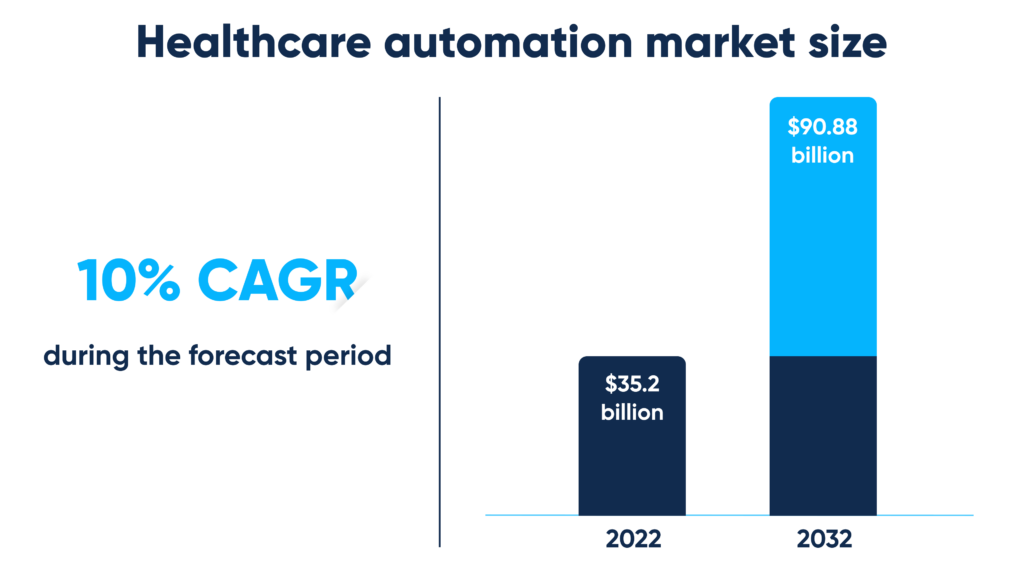Epic and Cerner automation: RPA technology

Beyond doubt, the modern healthcare industry is one of the most complex and data-driven among segments. Little wonder almost every healthcare provider is utilizing EHR and EMR software to manage data efficiently, Epic and Cerner systems as the most prominent in particular.
But what is it about those omnipresent platforms that leaves healthcare professionals feeling overwhelmed and how is that to resolve?
Epic vs Cerner unraveled: quick dive-in
Epic and Cerner are the two most popular electronic health record providers across the healthcare landscape – both provide information management and exchange, clinical documentation, mobile access, decision support, and revenue cycle management.
But how are these providers different?
Epic places an emphasis on improving patient engagement and facilitating the delivery of remote patient care. It serves large-scale facilities by integrating ambulatory services and comprehensive revenue management.
Cerner provides secure access to up-to-date patient information and serves a range of different scale clients. Those include specialty practices, urgent care centers, group medical clinics, and others.
In the table below, you’ll find an overview of the main characteristics in a side-by-side comparison:
| Epic EHR system | Cerner EHR system | |
| Client base | Large-scale facilities | A range of different scale clients |
| Market share | A 39% market share by beds in the United States | A 29% market share by beds in the United States |
| User interface | More intuitive, requires training | Less intuitive, requires training |
| Implementation complexity | Very complex and resource-intense | Situationally complex |
| Customization level | Custom templates and workflows | Custom dashboards |
| Third-party integration | Not available | Over 50 |
Epic vs Cerner unraveled: market insights
EHR software has revolutionized healthcare operations, eliminating traditional paper-based documentation. EHR systems are deployed for seamless information management and exchange, clinical documentation, decision support, and other mission-critical processes within larger healthcare facilities.
Talking about electronic health record systems, Epic and Cerner corporations are undeniable market leaders and capture over 50% of the market share.
As to the most recent report by Market.US, Epic is the leader among today’s technology providers:
- Epic corporation serves over 250 million patients worldwide
- Their system is trusted by over 250 thousand healthcare professionals
- The company has reported a robust annual revenue of about $3.4 billion, which highlights its sizable market share in the healthcare market
- Epic EHR is used to manage over 60% of electronic health records in the United States
As to the same 2024 report by Market.US, Cerner is not too far behind:
- Cerner corporation is used by over 27 thousand healthcare facilities all over the world
- Their system is trusted by over 125 thousand healthcare professionals
- The organization has reported a substantial annual revenue of around $5.5 billion, which emphasizes its strong market presence and great financial stability
- Cerner electronic health record is deployed in about 35 countries – an extensive global reach
Healthcare automation – work smarter, not harder
Healthcare operations performed day-by-day are monotonous, usually resource-intense, and reduplicative. Patient registration, appointment scheduling, data entry and update, prescription management, and others require hours of retrieving and re-entering patient information.
Healthcare leaders refusing innovation are missing promising opportunities and losing competitive strength. Increased time and cost, decreased accuracy, employee burnout, and non-compliance are just some problems to expect when counting on traditional manual execution.
RPA solutions can introduce greater performance without disrupting mission-critical operations.
No wonder the global healthcare automation market size was estimated at impressive $35.2 billion in 2022. The numbers speak volumes.

Healthcare automation gaining momentum
As to an older yet depictive McKinsey study, about 50% of global work activities can be successfully automated. More specifically, those tasks most susceptible to automation are activities in highly structured environments – the operations in the healthcare industry, government, manufacturing, and others.
As to an illustrative Fact.MR report of 2023:
- The global healthcare automation solutions market was valued $38.6 million in 2023
- The demand is estimated to reach $94 billion by 2033
RPA in healthcare practices: why extend Epic and Cerner systems
Why is Epic automation in demand, and can Epic robotics really become a thing in the healthcare landscape?
Despite the company’s assurances regarding user-friendliness, many users find their EHR system too complex. Given quite many features and rather intricate architecture, those users without specialized technical expertise are struggling when handling everyday processes.
What about Cerner innovations?
Despite the corporation’s devotion to simplifying daily communication and collaboration between employees, it is still necessary for users to receive technical training until competent with using the complex EHR system. While with other platforms, you can do worse, most users complain about simple processes being tangled.
Not to be superficial, let’s dive deeper into the biggest user-reported shortcoming of these EHR platforms:
Confusing workflows
Epic and Cerner both have reportedly confusing workflows, where navigation through features is challenging. The consequences – user frustration, reluctant adoption, increased inconsistencies, decreased productivity, and endangered patient safety.
Complicated documentation
Another shortcoming – Epic and Cerner systems are characterized by abundantly complicated documentation. The repercussions – increased time and cost, decreased accuracy, inefficient communication and collaboration, and even regulatory non-compliance.
Burdensome customization
When speaking about aligning with specific industry requirements, the systems are complicated to customize. The implications typically include resource-intense configuration, delayed implementation and deployment, deteriorated performance, and more.
Problematic maintenance
Updates, patches, efficiently addressing technical issues – the systems also present substantial shortcomings. Such complications come with disrupted workflows, system downtime, and degraded data integrity.
RPA for healthcare leaders: key processes to automate
In the table below, we listed the processes that can be automated to resolve the problems covered earlier:
| Smooth workflows | – Data entry and documentation – Appointment scheduling and reminders – Authorization processes and referrals – Account management and permission – Task prioritization and assignment – Report generation and distribution |
| Easy documentation | – Data entry and documentation – Data extraction and integration – Documentation management – Documentation review and sign-off – Template creation and customization – Version control and updates |
| Simplified customization | – User interface preferences customization – System setting preferences customization – Role-based access control implementation – Account management and permissions – The creation of custom documentation templates – The approval of custom template changes |
| Straightforward maintenance | – Software updates and patches – Database optimization and cleanup – Performance monitoring and alerts – Data backup and recovery |
Explore our recent takes on leveraging intelligent automation in the healthcare process:
How we can help
Abto Software has the domain-specific expertise to empower healthcare leaders by integrating RPA technology. Data entry, document digitization, claim processing, billing, coding, and more – RPA automation can transform manual workflows into easy-to-monitor, efficient processes.
Why wait to harness greater performance?
Our services:
- .NET development
- ASP.NET development
- Web app development
- Mobile app development
- Cloud services
- Full-cycle, custom software development
Our expertise:
Robotic process automation in healthcare operations – a change facilitating performance across departments.


